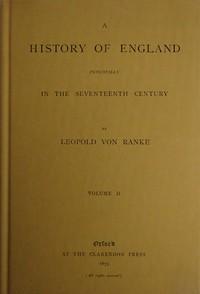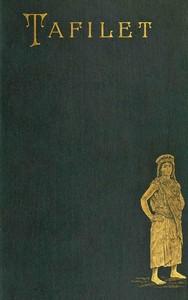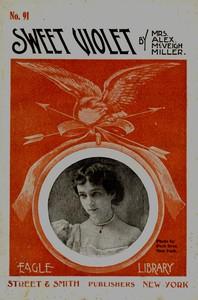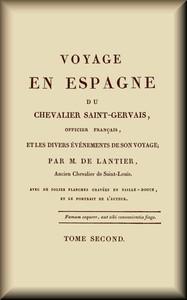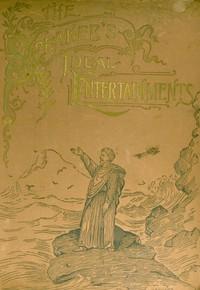|
|
Read this ebook for free! No credit card needed, absolutely nothing to pay.Words: 188440 in 34 pages
This is an ebook sharing website. You can read the uploaded ebooks for free here. No credit cards needed, nothing to pay. If you want to own a digital copy of the ebook, or want to read offline with your favorite ebook-reader, then you can choose to buy and download the ebook.

: A history of England principally in the seventeenth century Volume 2 (of 6) by Ranke Leopold Von - Great Britain History Stuarts 1603-1714; England Civilization 17th century@FreeBooksThu 08 Jun, 2023 se vexatious regulations which they made to enforce it. Other sovereign rights furnished an opportunity of levying considerable taxes on separate articles. It is calculated that up to the year 1635 Charles I had raised his income from ?500,000 to ?800,000. The King, says Correro the Venetian, moves among the rocks by which he is surrounded, slowly but surely. The judges explain the laws in his favour, as there are no Parliaments to contradict them: and his subjects do not then venture to withstand him. 'With the key of the laws he seeks to open the entrance to absolute power.' Much agitation had been caused by the previous renewal of old claims; and it was naturally doubled by this last claim, because it was the most comprehensive, and might be renewed at pleasure. The loudest remonstrances were heard. The official interpreters of the laws however came forward on the side of the crown, and acknowledged its right. In November 1634 the Judges gave sentence that the inland as well as the seaboard towns might be called upon for the defence of the coasts. This judgment did not contain a declaration that Parliament need not be consulted in the matter; but in February 1636 a decision on this point also followed. It was declared by a sentence of the Judges, that if the kingdom were in danger, and the king thought it necessary, he had the right of ordering his subjects under the Great Seal of England to equip as large a number of ships as seemed to him necessary; and that in case they should refuse to do so, the law gave him perfect right to compel them. The judges could not have delivered a more important decision: it is one of the great events of English history. The King commanded that it should be entered in the records of the Star Chamber, and of the Courts of Justice at Westminster, and that all possible publicity should be given to it, in order that every one who had doubted the King's right might be taught to know better. But even the sentence of the Courts of Justice had no longer absolute authority in England, where they were now deemed subservient or even corrupt. A gentleman of Buckinghamshire, John Hampden, who had there a very old family estate, refused to pay the sum for which he had been assessed, twenty shillings, not because of the amount, which was only trifling, but in order to bring the matter once more publicly under discussion. When he was cited before the Star Chamber to answer for it, he requested to hear the writ. After it had been read, he denied that it had any legal authority over him. The King, who thought himself perfectly certain of his right, had no objection that the question should once more be publicly discussed. Nor did he order others also who refused payment to be visited with penalties of real severity: the sheriffs in each case merely seized possession of property to the amount which they had to raise from each according to the assessment. They met with no resistance in this; but men refused to acknowledge the claim by voluntary payment. 'They stick to their laws,' writes one of our Venetian informants, 'and allow legal proceedings to be taken, solely to make it known that the laws are violated, and that they are compelled to pay by force.' But what a state of affairs hereupon set in! The whole administration of the state depended on the receipt of tonnage and poundage, the payment of which Parliament declared illegal, while the government insisted on it, on the ground that it had been made to the earlier kings; and all refusals of payment were overridden by the coercive power of the state. All other fiscal measures as well were considered wanton attacks on the fully acknowledged rights of private property, or as illegal. People gave way, but only in the expectation of better times. The opposition between what the government and what the nation or the Parliament thought legitimate, was presented in the sharpest outlines, when it led to acts of personal oppression. The members of Parliament, against whom the King had claims, refused to be brought to trial before the Courts of Justice before which they were summoned; for they affirmed that Parliament alone had the right to pronounce judgment on their conduct. They were condemned however, and the most resolute of them, Sir John Eliot, was treated with a severity bordering on cruelty: he died in the Tower. At times however the King's indulgence and mercy in turn appeared illegal, especially when they were extended to Catholics. This had so important an influence in the life of the King, that we must devote to it a closer examination. The old severe laws of Parliament against priests and Jesuits still existed, but, as the King had promised in his marriage-contract, they were no longer enforced. It was not only that the bloody executions of former times could not now be thought of, but even the pecuniary fines incurred by non-attendance at Protestant worship were reduced to half their amount, or redeemed in perpetuity by compositions allowed under the Great Seal. The spies who had formerly forced their way into houses, in order to look for priests who were thought to be hidden there, no longer showed themselves; and steps were taken under the influence of the Queen altogether to annul their authority to do so. The English Catholics affirmed that they had never enjoyed so much repose and security as under King Charles. Yet they felt anxious, because the existing laws could legally be revoked only by Parliament. The King certainly thought the power of dispensing from them an essential part of the prerogative; but public opinion took a different view, and the adherents of Parliamentary authority, especially the Puritans, on the contrary insisted that the laws must be as strictly enforced on this point as on any other. We are in possession of the copious letters of the Pope's agent Cuneo--a Scot whose real name was Con, but whom we shall speak of under the Italianised form of his name--from which we may gather with certainty how far the opinion was true, and how far it was not. A very lively impulse was given to the spiritual movement of the seventeenth century by the attempts to reunite the two communions. It had become clear as a result of a worldwide conflict again and again repeated, that Protestantism could not be overpowered. The inroad of the Swedes into Germany, the revival of the Protestant credit which was connected with it, the alliance of France with the Protestant powers, all gave a shape to European affairs in presence of which the hope of effecting a restoration of Catholicism must have appeared a cobweb of the brain. This led naturally to a revival of the old plans for bringing to pass some kind of reconciliation between the opposing churches. We meet with them in France, in Germany, in Poland, over the whole Continent. They were cherished by well-intentioned kings, powerful ministers, and learned writers of the first rank. In England there was in each of the two great parties a fraction which closely resembled the corresponding fraction on the other side. In the one party there were found many who took the oath of allegiance without hesitation, who acknowledged the supremacy of the crown, and attended Anglican churches, who made a figure in high places, and then perhaps after all declared themselves Catholics on their deathbeds. We might almost suspect that, from a superstitious opinion of the saving power of ceremonies, or because it was the safest course, they kept priests in their houses only for this last hour. But even among the Protestants we discover not a few who sought to strengthen the resemblances to Catholicism which were retained in the English Church. This was done principally out of dislike to the Puritans, who declared that the Pope was the Antichrist foretold by Scripture; while the others were inclined to recognise in him the true Patriarch of the West, if he would only admit some moderation in the exercise of his power. From this point of view they had publicly condemned the schism in sermons, at which the King and the court were present. They praised auricular confession and the bowing of the knee at the sacred name or before the crucifix. Even in the local arrangements of churches the innovations of the Reformers were done away. Everywhere the communion table had again to give way to the altar. Laud, Archbishop of Canterbury, acknowledged that the Church of Rome had an uncorrupted tradition on the main points of the Christian faith. He avoided the harsh expressions of controversial theologians about that Church, and loved to speak of a reunion between the divided members of the whole body of the Church. But he was by no means a Papist. Like the King he condemned the popular worship, especially the invocation of saints: in the adoration of the sacrament, the refusal of the cup, and the doctrine of purgatory, he also saw error, or superstition, or both. When, after his appointment, the question was put to him whether he would not be willing to become a cardinal of the Roman Church, that was only an attempt to kindle his ambition, and to open negotiations, which might have had further consequences: but he did not fall into the snare. After a time people on the contrary spoke of the probability that Cuneo might be raised to this dignity, which he hoped to achieve by the aid of the Queen, and that he might then remain in England wearing the purple. The Roman court was apprehensive lest a violent ecclesiastical quarrel for precedence might thus be raised. Between Cuneo and Laud, who outside the English court were considered allies, harmony by no means prevailed: they did not get beyond the external forms of ordinary politeness to one another. From the beginning Laud could not endure that another ecclesiastical influence should exist at court beside his own. Cuneo's letters to Rome show an ill-feeling towards the Archbishop which is mingled with bitterness, and even with a kind of contempt. Cuneo declares him incapable of contributing in the least to the removal of the English schism. With absolute certainty we can pronounce that the statement which was then made, that Charles in connexion with Cuneo and Laud designed to bring back the English nation to Catholicism, is erroneous. The supposed allies were personally bitter antagonists. The King, with his Archbishop, adhered to the point of view of the Anglican Church, which they only endeavoured to raise to complete supremacy. The controversy which then most busily engaged men of active minds, did not concern the differences between Catholicism and Protestantism. Only as to the frontiers of the spiritual and temporal power were opinions still wavering: on all other points every man had already taken his side. Even the old dispute between Lutherans and Calvinists about the Lord's Supper, although it still went on, attracted no special attention. The questions, which are properly traced to the spirit of the age, were fought out within the domain of the Reformed Church. They concerned the doctrine of election by grace, which determined the system of dogmas, and the influence in spiritual affairs appertaining to the temporal power, which was of decisive importance for the constitution of the Church. The Synod of Dort derived widespread importance from its adherence to the strict Calvinistic doctrines of unconditional election by grace, and of the independence of the Church. It condemned the Arminians, who were inclined to less rigid views on both questions: they were expelled from their offices in the Netherlands. Free books android app tbrJar TBR JAR Read Free books online gutenberg More posts by @FreeBooks
: Tafilet by Harris Walter Romberg De Vaucorbeil Maurice Illustrator - Morocco Description and travel; Atlas Mountains@FreeBooksThu 08 Jun, 2023
|
Terms of Use Stock Market News! © gutenberg.org.in2025 All Rights reserved.

